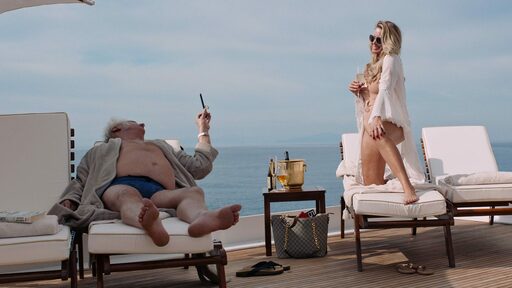On dead horses – A.O. Scott in NYT:
I’m tempted to begin this review of Ruben Ostlund’s “Triangle of Sadness” by apologizing to Lars von Trier and Michael Haneke for the skepticism, ambivalence and outright frustration I’ve expressed toward some of their films in the past. It’s not that I take any of it back: I still find the tendency in European cinema that those directors represent to traffic frequently in facile provocation and sadomasochistic arousal of the bien-pensant bourgeois audience’s eager self-contempt. But the two of them at least approach the boundless awfulness of the modern metropolitan West with formal rigor and intellectual discipline, and for that reason they have sometimes left me not merely annoyed, but genuinely disturbed, even moved.
Ostlund, who, like Haneke, has won the Palme d’Or at Cannes twice — von Trier only managed it once, for “Dancer in the Dark” — is a different matter. They are influential filmmakers. He is, in the debased social media sense of the word, an influencer. He’s like Clarabell to von Trier’s Pagliacci or the Hamburglar to Haneke’s Professor Moriarty: an amusing enough character, but only if you don’t take him too seriously.
Which may suit him fine. His most recent films — “Force Majeure”and the two Cannes laureates, “The Square” and “Triangle of Sadness” — are best when they’re silliest. But Ostlund’s modest comic skills are tethered to grandiose satirical intentions. “Triangle of Sadness,” in effect a shaggy-dog art-house reboot of “Gilligan’s Island,” has many insights to offer about the shallowness of supermodels, the vulgarity of Russian oligarchs and the brutal inequality of global consumer capitalism.
(…)
‘Before the tempest, we have spent some time with Carl (Harris Dickinson) and Yaya (Charlbi Dean), professional hotties who supplement their modeling work with social media self-promotion. We follow them through an awkward dinner date, where Carl wonders why he always picks up the check even though Yaya earns more money. The argument, which Carl pursues with the dogged righteousness of a guy on Twitter asking Serious Questions, demonstrates Ostlund’s refusal to adhere to the corrupt bourgeois notion that brevity is the soul of wit. There is no dead horse he will not beat.’
Read the review here.
An apology to Haneke and Von Trier is well-deserved.
And brevity is the soul of wit, yes yes yes, but a moderate amount of meanness might help as well. Read the review I would say.
I happened to like 'Force Majeure' (so did Stephen Holden in NYT) and to a lesser degree ‘The Square’.
The slickness of Ostlund’s movies has always been obvious, but he appeared to have a great understanding of the soul of slickness. It’s more a ghost than a soul but still.
And these advertisements for the status quo; the problem is the advertisement, not the status quo. No artist is supposed to be a revolutionary, au contraire the idea that the artist must act as a revolutionary is as a much a pillar of the status quo as Ostlund’s movies themselves.
And those who stormed the Capitol on January 6 2021 hated the status quo. It might be good to remember that as well.
